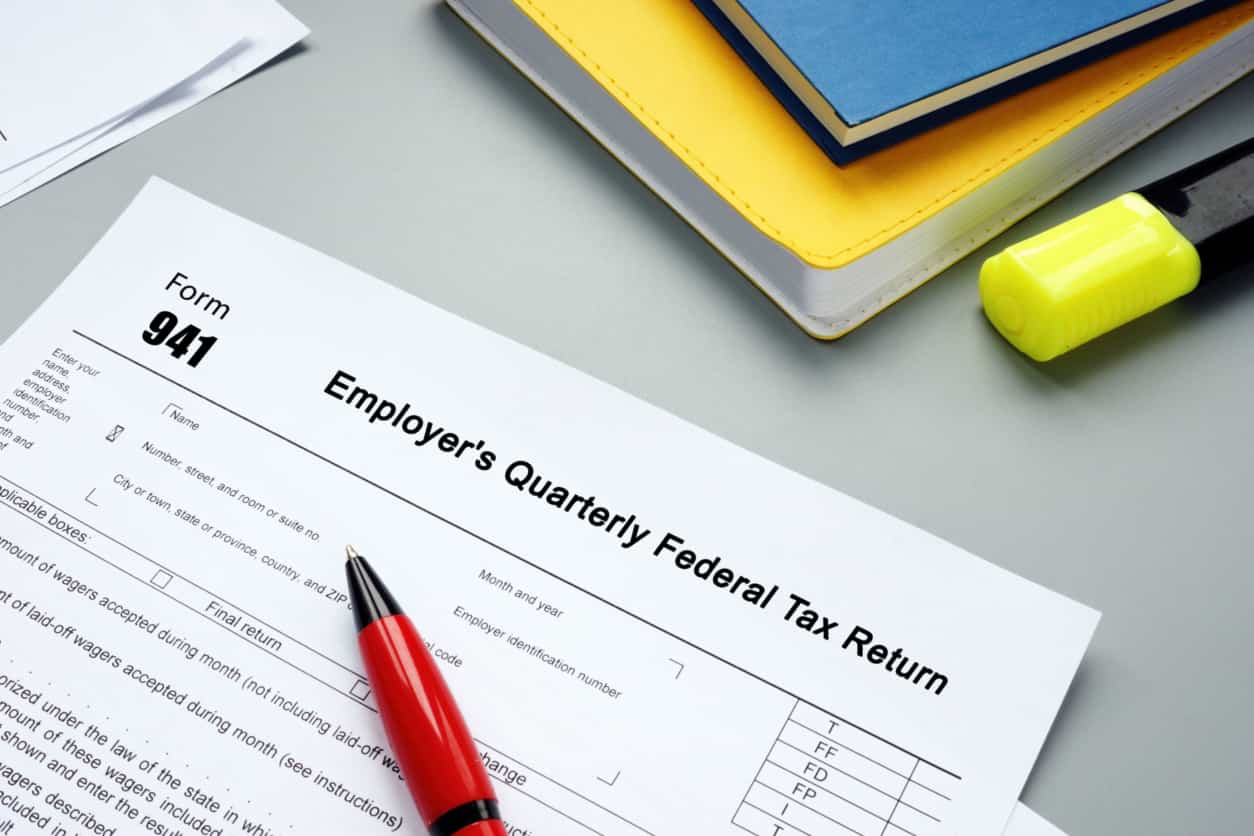What Is IRS Form 941 Used For?
Employers file Form 941 to report Medicare, Social Security, and income taxes that are withheld from employees’ paychecks. IRS 941 is also used to pay Medicare or Social Security taxes owed by an employer.
Who Files IRS Form 941?
Companies with employees must file Form 941 every 3 months to report quarterly employment taxes. Only three types of employers are exempt from filing a 941:
- People who hire maids, full-time nannies, and other household workers.
- Seasonal businesses do not need to file a Form 941 if they have not hired anyone.
- Farming businesses that only hire workers to perform livestock and/or crop-related tasks.
Note that businesses with less than $1,000 in employment tax for the tax year need to file Form 944 instead of Form 941.
How Do You Fill Out the 941 Tax Form?
Employers report the following on a 941 tax form:
- Employee wages
- Employee tips
- Other employee compensation
- Federal income tax withheld from wages, tips, and compensation
- Employee and employer Medicare and Social Security taxes
- Additional Medicare tax withholdings
- Quarterly adjustments to Medicare or Social Security taxes (if applicable)
After completing Form 941, businesses will know how much they must pay to cover payroll tax obligations for the specific quarter.
Can You File IRS 941 Electronically?
Yes, businesses can e-file Form 941 as well as other employment tax forms, such as 940, 943, 944, and 945.
The IRS has two options that employers can use to file a 941:
- You want to e-file the form yourself. IRS-approved software must be purchased for this option.
- You want a professional tax preparer to file Form 941 for you.
Where Do You Mail IRS 941 Payroll Tax Form?
If you choose to mail your 941 instead of filing it electronically, the address that employers should send 941 payroll tax forms differs according to the state in which they operate their business. The payroll tax form mailing addresses for all 50 states can be found here: 941 Mailing Addresses.
When are IRS 941 Payments Due?
Due dates for payroll tax deposits involving income, Medicare, and Social Security taxes can be made at the same time. However, the payment schedule that a business uses depends on whether that business files its federal tax return annually or quarterly, and how much is reported on the tax return over a certain timeframe referred to as a lookback period.
Some employers must also deal with due dates for unemployment tax deposits, which must be deposited quarterly. An exception to quarterly deposits is if the total collected tax (per one quarter) is less than $500.
Payroll tax due dates that fall on holidays or weekends can be shifted to the next business day without penalty.
Who Is Responsible for Paying 941 Taxes?
Unless an employer qualifies for exemption from filing Form 941, all employers are responsible for withholding the appropriate amount of taxes from worker paychecks and paying their portion of the 941 taxes.
Keep in mind that business owners and corporate officers can be personally liable for payroll tax debt, especially for businesses like LLCs and corporations.
Businesses are expected to have funds set aside to remit payroll taxes, including unemployment taxes. The IRS calls such funds “trust fund taxes.”
What Happens If You Don’t Make Your 941 Tax Payment?
Businesses that do not make their 941 tax payment on time are subject to a Failure to Deposit (FTD) penalty issued by the IRS. An FTD penalty takes effect 24 hours after the deposit due date is missed.
Penalties include:
- 6-15 days late: 5% of unpaid amount.
- More than 15 days late: 10% of unpaid amount.
- After receiving a demand letter: 15% of unpaid amount not remitted within 10 days of receiving letter.
Deliberately failing to make a 941 tax payment incurs a 100% penalty that the IRS calls a Trust Fund Recovery Penalty.
Can You Get a 941 Refund?
Businesses that did not take advantage of the Employee Retention Credit enacted during the COVID-19 pandemic (2020-2021) may still be eligible to receive a 941 refund with the ERC. Employers must provide proof to the IRS that they “sustained partial or full suspension” of their business that limited group meetings, travel, or commerce due to the pandemic.
Need more help? You can start online by answering 6 simple questions. We never charge for ‘investigations’ or consultations. You can also call us at 866-568-4593.
6 Simple Questions. Free Evaluation.
Join our Newsletter
Enter your email address to join our free newsletter. Get all the latest news and updates.

